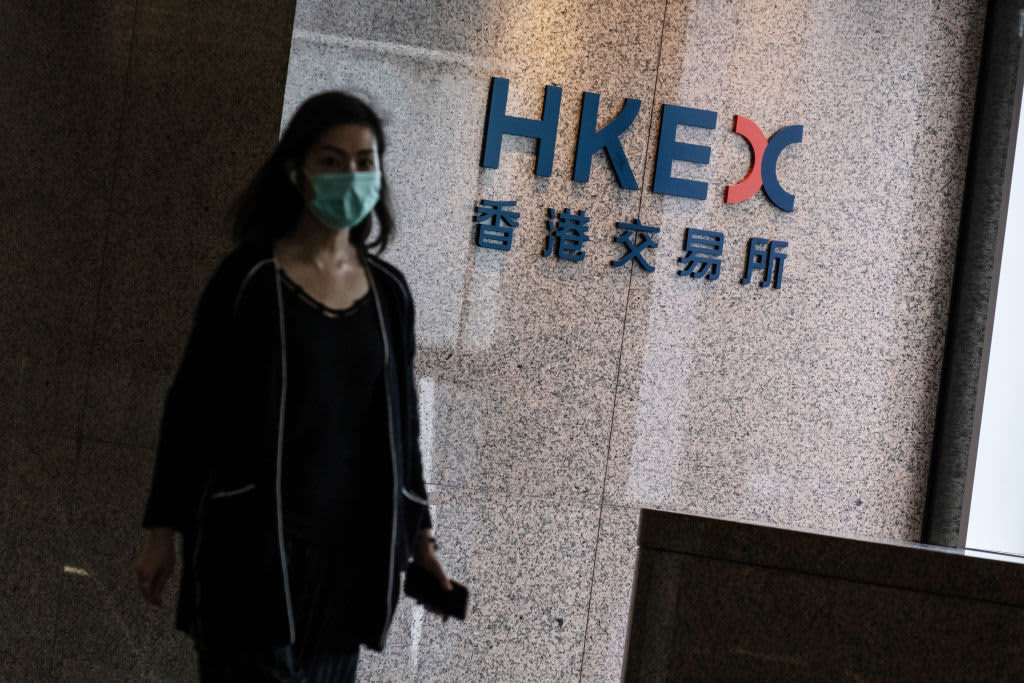A person wearing a protective mask passes through the signs of Hong Kong Exchanges & Clearing Ltd. (HKEX) displayed at the Exchange Square complex in Hong Kong, China, on Wednesday, August 19, 2020.
Roy Liu | Bloomberg via Getty Images
This week’s announcement about a reversal in the Hong Kong stock index is a “positive move” that could help diversify risks, according to Min Chen of Somerset Capital Management.
“We believe that the new methodology (from the Hang Seng Index) will be a good way to avoid over-concentrating risks and is very effective in helping passive investors,” Chen, China’s strategy portfolio manager at the company, told Street Signs. Asia “on Tuesday.
Passive investment is a long-term investment strategy aimed at minimal trading and generally involves the purchase of funds that track market barometers.
His comments came after Hang Seng Indexes Company, the index’s compiler, announced on Monday that it would adjust Hong Kong’s main stock benchmark. The decision came after a month-long consultation exercise with its stakeholders, the company said.
In a press release, the Hang Seng indexes highlighted five major changes in the Hang Seng index. The changes will be implemented following the revision of the index in May:
- Increase the constituents to 100: Aiming at an increase in the number of HSI constituents to 80 in mid-2022, with the ultimate goal of having 100 companies on the index. The index currently has about 55 constituents.
- Select constituents from seven industry groups: This ranges from finance, information technology to health. The goal is to achieve at least 50% coverage, by market capitalization, for each industry group.
- Shortlist history requirements: This will be reduced to three months, potentially making it faster to add new listings to the index.
- Maintain representation of Hong Kong companies: About 20 to 25 constituents classified as Hong Kong companies will be held on the HSI, and the number of constituent shares will be reevaluated at least every two years.
- Reduce the weighting limit to 8%: All HSI constituents – including those with weighted voting rights or secondary listings – will be subject to an 8% weighting limit. Constituents with weighted voting rights or secondary listings are currently limited to 5%, while others are limited to 10%.
“The new improvements in HSI will further increase its representation and make the Index more balanced and diverse,” said Anita Mo, CEO of Hang Seng Indexes, in the statement.
The Hong Kong benchmark index has had a strong start so far this year, rising more than 9% since January, until the close of Wednesday.
Chen, the portfolio manager, said the new changes will increase Hang Seng’s exposure to new sectors of the economy, as well as maintain a reasonable amount of diversification.
Pointing to a drop in the weighting limit to 8%, he said this was much lower than other indices. He cited the MSCI China index as an example, where tech giants Alibaba and Tencent account for more than 30% of the cumulative weight.
How investors can react
Goldman Sachs pointed out that investors are likely to relocate their portfolios in light of the Hang Seng reform.
“As the HSI increases the number of constituents to 80 and applies an 8% weighting limit to all constituents, the main constituents of the current index could see outflows led by the reallocation, as their index weights would again be limited to 8%, “Goldman analysts said in a note on Tuesday.
… We hope that the improved HSI index, with its expanded index coverage and greater exposure to New China, can attract more capital to accompany it as a benchmark.
Meanwhile, weighted voting rights or secondary listing companies – plus potential new additions on the index – you can see “big entries” as the index ceiling is raised from 5% to 8%.
Companies currently weighing more than 8% on Hang Seng include gaming giant Tencent, as well as life insurer AIA, according to data from the Hang Seng Indexes.
“In addition to portfolio relocation flows, we hope that the improved HSI index, with its expanded index coverage and greater exposure to New China, can attract more capital to accompany it as a benchmark,” said Goldman Sachs analysts.
“As the index cap can increase by 25% when the number of index constituents reaches 80, we anticipate that the (assets under management) that accompanies HSI may grow proportionally from about $ 20 billion now to $ 25 billion “they said.
Subscribe to CNBC PRO for exclusive insights and analysis, and live weekday scheduling around the world.
